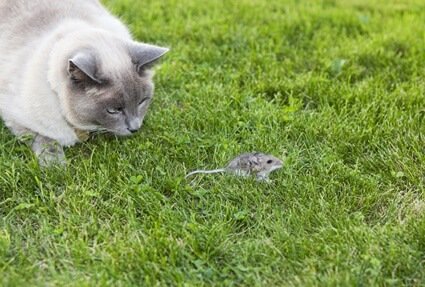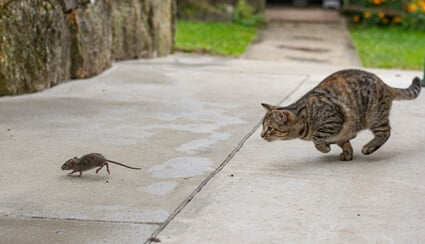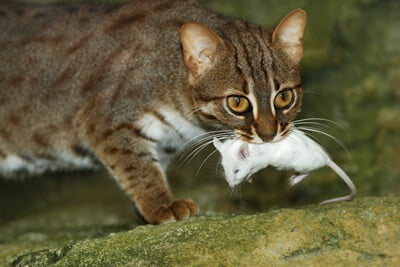Cats and mice have always been natural enemies. Cats hunt and kill mice, and mice show a natural fear when presented with a cat. However, you may wonder if cats can deter mice, not just catch and eat them.
Cats can keep mice away since mice can detect cats’ scent chemicals. These are secreted in feline urine, saliva, sweat, fur, and dander. This is done through an organ in their nasal passages known as the vomeronasal organ (VNO). Mice can hear cat noises, such as cat meowing and purring.
However, not all cats are good hunters or want to hunt in the first place. Certain breeds, such as Manx and Japanese bobtail cats, have a more natural affinity for hunting. You can even rent or borrow a cat to catch the mice in your home and leave its scent behind to put off future mice.
Are Mice Naturally Afraid of Cats?
Because mice are natural prey to cats, they’ve developed an innate fear of cats.
It may be this natural fear that has caused rats and mice to develop strong olfactory senses. They would’ve evolved to have a better sense of smell so that they could avoid their predators more effectively.
Of course, it’s difficult to assess true fear in animals, especially since we cannot ask how they feel. We can still judge how afraid mice are of cats based on their behavior.
Here are actions that mice display when they’re fearful around cats:
- Freezing in place
- Fleeing
- Attacking
Mice are afraid of cats because they can recognize their predators. However, the abilities that mice leverage to detect cats are more complex than this. Aside from their sense of sight alone, mice rely on smell and hearing to detect cats.
A mouse will react fearfully when it senses the presence of a cat through any of these means. That ensures that a cat in the house is a powerful deterrent against mice. Even smelling that a cat has passed through the area, or hearing one a few rooms over, can encourage a mouse to go the other way.
Can Mice Smell Cats?
Mice have an extraordinary sense of smell. Their strong sense of smell is used to locate food, find mates, and sense predators like cats. In particular, mice detect the scent of predators over long distances through pheromones.
According to Brain Research, certain pheromones are present in feline urine, saliva, sweat, and fur. There are also some detectable in a cat’s dander or skin flakes. A pheromone is a chemical signal that many animals use to learn information and navigate their surroundings. That’s true when a pheromone belongs to an animal of the same species or even a different species.
A mouse can detect these pheromones through a special organ within its olfactory system. More specifically, it’s found in their nasal passages and is known as the vomeronasal organ (or the VNO for short). When the pheromone enters a mouse’s nose, these chemical signals bind to special chemical receptors within the vomeronasal organ. This, consequently, triggers a fear response.
You can think of these receptors as an “on and off” switch, and the chemical signals determine when this gets switched on or off. When the chemical signals are unbound to the receptors of the vomeronasal organ, the fearful reaction is kept off. In contrast, if these chemical signals reach the vomeronasal organ and bind to its receptors, the fearful reaction is turned on.
When a mouse smells a cat’s pheromones, it’s automatically flooded with fear chemicals from its brain. These chemicals work to enhance the mouse’s reaction time and safely guide it away from wherever it picked up these smells. That ensures it can flee the area and avoid the cat, and thus a lethal encounter.
Are Mice Afraid of Cat Sounds?
A mouse’s sense of hearing is important for determining where its predators are located. The common mouse hears a much wider frequency of sounds than a human.
To compare, mice can hear a frequency range of 1 kilohertz (kHz) to 70 kilohertz. Meanwhile, humans can only hear a frequency range of 20 hertz (Hz) to 20 kilohertz. This means we cannot hear certain sounds that mice can since they can hear noises at a higher frequency. Cats, however, have one of the broadest hearing ranges among all mammals, hearing an average range of 48 hertz to 85 kilohertz.
According to the Journal of Veterinary Science, the average frequency of a cat meow is 45 hertz to 64 kilohertz. Meanwhile, the average frequency for a cat purr is 25 hertz to 150 hertz. This fits into the hearing range of the common mouse. Therefore, mice can hear cats meowing and purring, if not more.
This can be used to detect where cats are relative to where the mouse is, resulting in a fearful response within the mouse that hears it.
Below is a summary highlighting these hearing ranges and if a mouse can detect them:
- Human:20 Hz to 20 kHz
- Cat: 48 Hz to 85 kHz
- Mouse: 1 kHz to 70 kHz
- Cat Meow: 45 Hz to 64 kHz (within a mouse’s hearing range)
- Cat Purr: 25 Hz to 150 kHz (partly within a mouse’s hearing range)
Do Cats Keep Mice Away From Your Home?
If mice can see, smell, and hear cats quite clearly, it stands to reason that having cats on your property should deter mice from your home. This is true to an extent.
However, mice are called pests for a reason. If they cannot find any other area to safely live and nest, then they’ll find ways to avoid the cats in your home. They can do this by nesting in attics, walls, and other small spaces that your cat cannot get to. If you own a cat and are still contending with mice, this is often the reason.
Nonetheless, there’s still a high likelihood that having a cat will keep mice away. That’s because mice, as prey animals, prefer to live away from danger. With a cat in the home, all other options become more appealing. Mice rarely lack better choices, as they’re highly adaptable to many environments.
If you’re concerned about certain holes that mice may enter through, you can use some of your cat’s hair and litter to keep mice away. Remember that certain smells secreted from your cat’s hair and urine will deter mice since they trigger a fearful response.

Best Cats to Get Rid of Mice
All cats hunt mice, but certain domestic breeds are more likely to do so than others. Just keep in mind that, even if your cat is one of the breeds listed here, this does not guarantee that your cat will get rid of mice in your house.
Each cat has its own unique temperament and personality. This may affect its likelihood of hunting in the first place. Domestic breeds known best for hunting mice include:
- Abyssinian
- American Shorthair
- Burmese
- Chartreux
- Japanese Bobtail
- Maine Coon
- Manx
- Persian
- Siamese
- Turkish Angora
Can You Rent a Cat To Get Rid Of Mice?
Pest control companies are not always a viable option if you have a mice infestation in your home. Depending on where you live, pest control may be out of your budget, out of your city, or less-than-ideal due to your living circumstances. Although it’s an “out of the box” idea for getting rid of mice in your house, it’s possible to get a cat for the sole purpose of eradicating mice.
Where you are located does depend on if these services are available to you, however. Some companies allow you to rent out their cats to get rid of mice, while others only allow adoption.
For instance, the Animal Humane Society allows you to adopt healthy cats that are not well adjusted to being companion pets. They work to handle your rodent infestation through the Barn and Business Cats program. These cats are more independent and are more comfortable with humans at a distance.
If you are only interested in renting a cat, companies like the Humane Rescue Alliance Blue Collar Cat program. This company only services Washington, DC, and surrounding areas. You can perform some research to see if there are services within your area.

Borrowing A Cat To Get Rid Of Mice
Borrowing a cat to get rid of mice is an alternative option. If you have a friend or neighbor that owns a cat, you can borrow their feline (with permission, of course) to see if it will help you with your mice infestation. This is only a temporary solution for your problem, though, which may or may not solve the issue.
Cats take some time to adjust to a new environment. Even if you could borrow a cat to hunt for mice on your property, you have to keep this in mind. Some people may not have the time to wait for the cat to become well-situated in their temporary home.
Additionally, your home may not suit all of the cat’s needs. Each cat is particular about many things, such as diet, bedding, amount of space, and the availability of toys and attention.
As mentioned, not all cats will hunt mice if they want to hunt at all. It is not that uncommon for domestic breeds to not eat mice at all. Cats are intelligent and are sometimes able to detect certain prey that isn’t suitable for consumption. Thus, they avoid eating such prey.
Many small animals, including mice, carry diseases that can pass to predators if eaten, making them sick. Therefore, borrowing a cat to get rid of mice may be hit or miss for your rodent infestation.
Are Cats The Best Way to Get Rid of Mice?
Domestic cats have a powerful sense of smell, sight, and hearing that helps them hunt their prey, including the common mouse. If you are a cat owner, it may be tempting to have your feline companion help you control your mice infestation for free. But are cats the best way to get rid of mice?
For the most effective solution against mice infestations in your house, cats aren’t the answer. Although domestic cats are capable of hunting and helping with mice infestations, one should not rely solely on their cat to clear the problem up on its own.
This may be disheartening, especially if you were hoping to find a potentially cheaper alternative to clearing up the pests in your home. Remember that each cat is different in its way. Many domestic cats, especially those consistently well fed and provided for, do not tend to seek out small prey, much less get rid of them at all.
However, don’t lose all hope since you can pair your cat’s natural hunting abilities with mouse traps that you can buy at your local store. Do exercise caution when buying these traps because your cat may still get to them. In the worst cases, this can cause potential injury or illness if your feline friend did manage to get into the mousetrap somehow.
These traps can help you catch mice in areas that your cat cannot reach, such as:
- Small spaces
- In the walls
- High, closed-off locations that your cat does not have access to, such as the attic
Pooling different resources together is likely the most efficient and effective way to rid your house of these unwanted guests. If the situation is in dire need of help, do try to seek out additional services so that you can get rid of your mouse problem.

